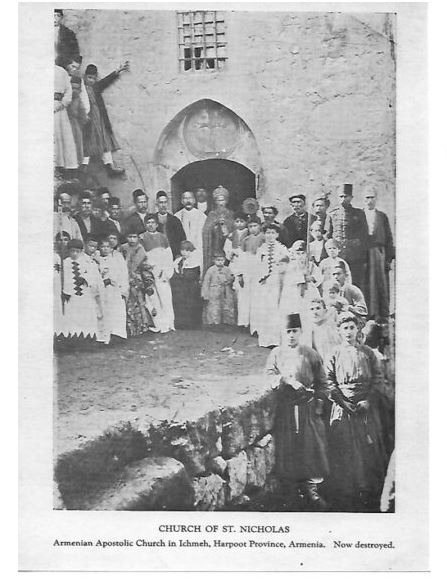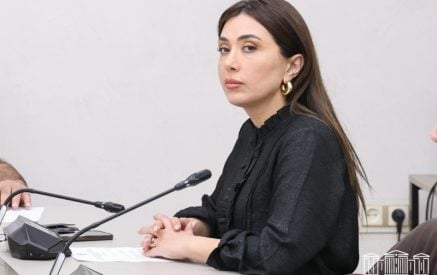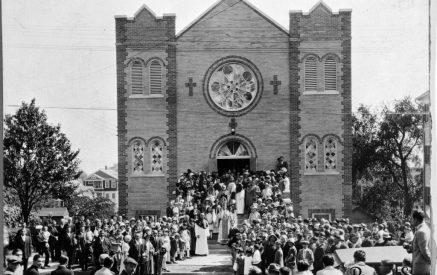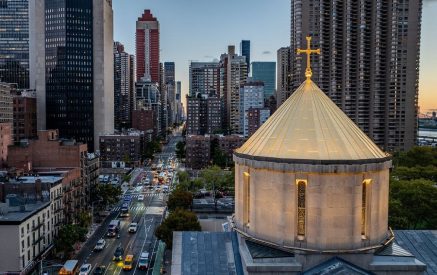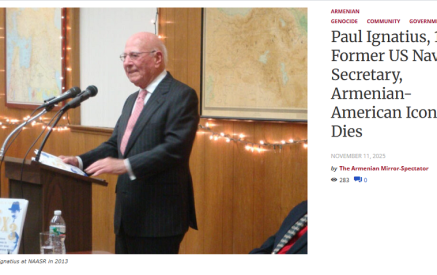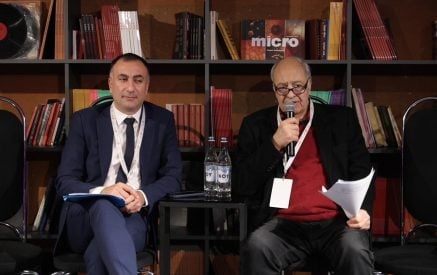by The Armenian Mirror-Spectator
Worshipping in the sanctuary of the Armenian Church of the Holy Resurrection in New Britain, Conn., always evokes feelings of comfort and security for me. I am encapsulated in warmth, reflection and safety.
My thoughts, however, sometimes turn to a time almost 110 years ago, in a little remembered village named Ichme in the former Ottoman province of Kharpert. There, I imagine my grandfather, Garabed, also being in the local Armenian Church, that one named St. Nicholas or Soorp Nigoghos.
Read also
But I imagine for him not the sanctuary of peace and security that I enjoy: rather I think of just the opposite.
I think of a horrible time when the sanctity and safety of the church was shattered, on the eve of the Armenian Genocide of 1915 when more than one and one half million ethnic Armenians ultimately perished at the hands of the Ottoman Empire.
My late father, who was only 10 years old at the time, remembered my grandfather and other elders from Ichme and neighboring villages being rounded up and cruelly imprisoned in their own church, crammed in like sardines, denied contact with their families and uncertain of their own fate.
What went through my grandfather’s mind as he witnessed his hallowed church desecrated and turned into a prison for its parishioners and others.
I wonder.
He had been an avid reader of an Armenian-language newspaper which came from Istanbul and knew that a tumultuous time was approaching. Of late, there had been a change in the demeaner and action of the Turkish gendarmes and military toward the Armenians; a dark cloud appeared to loom over all the local villages. Suddenly, the newspaper stopped coming.
The Armenian elderly villagers were isolated and watched. They were told that they were going to be sent to another town to perform labor for the Turkish army for as they were too old to be officially conscripted. But somehow they sensed a sadder fate for themselves. Did they think that the unthinkable was about to happen? Did my grandfather believe that this would be the end of the Armenian race and its cherished Christian Church? Would the bright flame of Armenian Christianity — adopted as a religion by Armenia in 301 AD, the very first nation to do so — be extinguished in the murderous days lying ahead?
Despite the signs of impending disaster, could my grandfather ever have imagined the incredible scope of the atrocities which were to come? That the region would be known as “The Slaughterhouse Province” following the descriptions of US Consul Leslie Davis who referred to “what is probably the most terrible tragedy that has ever befallen any people in the history of the world?”
Did my grandfather know that he would never see his wife or children again? Did he think that they too would soon be rounded up? Was he heartbroken when his son tried to visit him in the church but was denied access and was only able to converse by shouting over the din. Did they realize that this was the last time they would ever hear each other’s voice?
I wonder if my grandfather and his fellow prisoners, outnumbered , disarmed and deceived, realized, after their protests, resistance and a short-lived escape by several of them, that they would soon be marched — roped together in groups of 10 — to the nearby Arpa Talatsee Valley before dawn, where they would be executed by machine gun fire?
Did he ever imagine in spite of the killings which were to follow and which would eventually bring forth a new word — genocide — that his son, my father, Nigoghos, through his resourcefulness, courage, and the kindness of others, would escape, survive a perilous trip through the desert? That he would find his way to a Danish orphanage in Aleppo only to be found by his father’s friends and the benevolence of other former villagers and come to America?
Could my grandfather ever have imagined that not only would the Armenian Church survive the Genocide but thrive and prosper throughout a far-flung Diaspora?
In his darkest hours, could my grandfather Garabed have imagined that he would have a grandson, Garabed, my late brother, who would become an ordained deacon in the Armenian Church in America?
I wonder
Did he fear that he and his fellow villagers would be forgotten and erased from human memory? Was there a way for him to believe that in a century he and the others who had perished would be elevated to martyrdom by the Armenian Church?
Could he have thought, during that bleak time, that the Armenian culture and religion would not perish but rather that his martyrdom and sacrifice and that of the countless others who gave their lives, would ultimately inspire future Armenians to cherish their heritage, culture and religion with a zeal and passion never possibly imagined?
Could he have imagined, after all of the countless words spoken in condemnation of that horrible time, that genocide would continue over and over again in the coming decades: even that future ethnic Armenians would continue to experience genocide and ethnic cleansing In a region called Artsakh some 109 years later.
And would he have despaired to think that today as in 1915, the world would continue to look on impassively, ignoring the barbarity and savagery, without taking meaningful action to stop the atrocities and desecration?
But most of all, could he have realized and would he have been proud that future generations of Armenians would gather all over the world in April each year to commemorate that tragic time more than one hundred years ago? That they would urge and plead with people of all nations to respect the sanctity of human life and the need to forever remember the inhumanity and shame of genocide.
In those dark and forlorn days, did my grandfather and the other Martyrs know that they would always inspire their descendants and never, never be forgotten?
I wonder.
(Harry Mazadoorian is a retired attorney, arbitrator and mediator. He is the son of Armenian Genocide survivors, the late Yegsa and Nigoghos Mazadoorian. Three of his grandparents perished in the Genocide. He wrote this article based upon a family history compiled by his late brother Deacon Garabed, Charles, Mazadoorian.)




















































